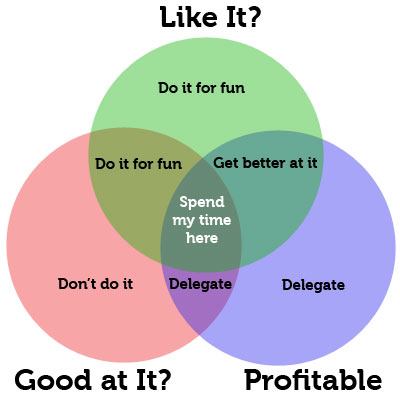For many years I’ve operated my business the same way: working very hard and trying to get as much done as possible. But for some reason I wasn’t very successful and I definitely wasn’t happy. I’m like a little kid: I like asking “why?” a lot. Especially when things aren’t working out. There had to be a better way.
The Advice I Got
I decided to talk to my friend Josh. He’s very smart and I love the way he helps others: he asks questions instead of giving advice. He never assumes he understands every situation, but he asks really good questions. “Is it possible that you’ve lost touch with your purpose?” Josh asked. “Is it possible that you’re so focused on doing stuff that you forgot why you’re doing these things in the first place?” “Yes”, I said. “That’s exactly what happened.”
My “Like-Good-Profitable” Theory
I created a spreadsheet with all the things I was doing and other things that I wanted to do. And then I added three columns:
- Do I like doing this?
- Am I good at this?
- Is this profitable for my business?
And then I created this graphic to remind myself what to do with each item on the list based on my answers.

In short, this is how it works:
- If something is profitable but I don’t like doing it, I delegate it.
- If something isn’t profitable but I like doing it, I call it a hobby and do it for fun.
- If something is profitable and I enjoy it but I’m not good at it, I try to get better.
- More importantly, I want to spend my time doing things I like, I’m good at and are profitable for my company.
This is the area where you can make a real difference: when you’re doing the right thing, you like it and you’re good at it.
Why Doing LESS Is Actually a Better Idea
Once you’ve figured out what you should be doing, you need to buy into the idea that doing fewer things extremely well is much better than doing more things just well. Let’s assume you work 40 hours a week and you’re good at prioritizing (i.e. doing the most important things first and then moving on to less important things.)
Let’s say your week looks like this now:

Now let’s say you eliminate, postpone or delegate the four least important tasks of the week, which should free up 17 hours a week:

What if you could use those 17 hours a week to kick ass doing the six most important things of the week?

The Takeaways
I want to give you some examples of the things that are possible when you decide to do a few very important things extremely well (as opposed to doing a lot of stuff just well):
- I can take two hours to write a great blog post instead of having to “crank out” three mediocre ones in that time.
- When I meet with someone, I give myself enough time to do some research about them, come to meetings prepared, have more fun (because I don’t have to rush to the next meeting) and make a much better first impression.
- When I meet with one of my employees, I take the time to listen to them, absorb their ideas and make sure they feel taken care of. I no longer feel the desire to end the meeting as quickly as possible so I can go “get more stuff done.”
- The quality of my work has been much better in the last year. I care about every project I work on. I switched my focus from “I need to finish this as soon as possible” to “I’m going to do my absolute best with this project.”
- Not only is the quality of my work better, I’m much happier too. I no longer feel I’m always running from thing to thing. I immerse myself into every project I work on and have a lot of fun with most of them. The level of satisfaction I get from doing something amazing is much greater than the level of satisfaction I used to get from getting as much done as possible.
Stop and take a break. Take a day to remember why you’re doing what you’re doing. Find those things that are important, you like doing and are good at. Make them your priority. Postpone, eliminate or delegate everything else. Give yourself the time you need to do a remarkable job. At the end of the day, the people who get all the credit aren’t the ones that get the most done, but the ones that do truly great things.

